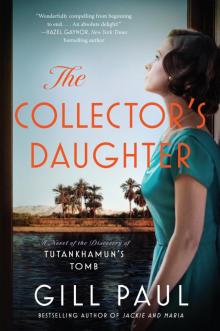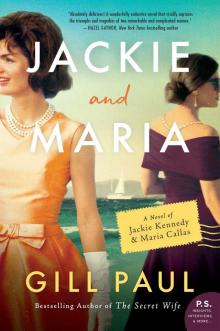Jackie and Maria Read online
Page 3
“Divorce would kill Jack’s career,” Black Jack said over their chicken cacciatore, then took a slurp of wine. “It’s difficult enough getting elected as a Catholic because Protestants will be biased against him—but if he’s a divorced Catholic he won’t even get the Catholic vote.”
“He should have thought of that sooner,” Jackie replied, peering into her compact mirror and wiping away mascara smudges. She didn’t want a divorce. She wanted Jack. But she wanted more of him. She wanted them to be able to talk about the baby they had lost. She would have liked for him to be with her when she was told Arabella had died. And she wished he wouldn’t cheat on her. Was that too much to ask?
“Rise above it and keep your dignity,” Black Jack counseled, tilting his head toward the photograph. “Make sure he treats you with the respect due to a wife. No fornicating in your home, or parading other women under your nose. Draw the line at that. But stay married, honey. That’s my best advice.”
On the train back to Washington, Jackie wondered if other wives put up with this. In novels or plays, cheating husbands always got their comeuppance, but perhaps it wasn’t the same in real life. Why had she picked a man like Jack? Was it partly because he reminded her of her flawed but adorable daddy?
Looking back, the only period in their marriage during which she could say for sure he’d been faithful was after he’d had back surgery in 1954 and was laid up for a few months. She’d been a good wife then as now: arranging visitors to entertain him, reading magazine articles to him, feeding him his favorite foods, devising ways to make love without straining his stitches.
But after he recovered he became preoccupied again. He popped home from the office to shower and change his clothes before dashing off to more meetings. Were they really “meetings,” or was that a euphemism? Did he have a mistress right on their doorstep in Washington?
She had a choice to make: she could do as her daddy suggested and rise above it; she could turn detective and confront him whenever she caught him; or she could ask for a divorce. Even if she didn’t go through with it, she knew the suggestion would shake him up. His political future relied on a stable marriage.
She knew what her mother would say: “Don’t wash your dirty linen in public.” But Jack owed her for this. He’d have to buck up his ideas big time if he wanted to hang on to her.
Chapter 5
Milan, Italy
December 1957
The week before Christmas, the telephone rang at Maria’s Milan townhouse, and when she answered she heard Aristotle’s voice on the line. Battista must have given him the private number.
“The forecast is for calm seas so we’re planning a New Year’s Eve party on the Christina. I wondered if you and Battista might come. I could send a plane to pick you up.”
She laughed at the ostentation; not many party invitations included such an extravagant offer! “I’m afraid I can’t. I’m singing in Rome on the second, to an audience that includes the Italian president. I mustn’t let them down.”
“I could fly you to Rome on the first,” he persisted.
“Thank you,” she said, “but it doesn’t work like that. I need to prepare for big concerts. For several days before, I’ll either be rehearsing or I’ll be resting my voice.”
“What a bore!” he exclaimed. “I would be vexed if my work stopped me having fun.”
“I’ve never thought of singing as work,” she said, then paused to try and find the words to express herself without sounding too pretentious. “It’s the greatest source of joy in my life. When I’m immersed in a production, it’s so all-consuming and fulfilling, I can’t think about anything else.”
“Like sex, then?” he retorted, and she blushed, glad he couldn’t see over the telephone wire.
“I suppose there are similarities.” Maria giggled, nervously. She wasn’t used to discussing sex with anyone—not even her husband. “It’s as if something else takes over when I sing—a divine energy, a creative force, call it what you will—and it fills me from top to toe . . .” She stopped, feeling self-conscious. “Now you’re going to laugh at me!”
“I wouldn’t dream of it,” he said quietly. “It’s clear this is what you were born to do, and I’m glad it brings you such pleasure. You’re lucky.”
“I am,” she agreed. She didn’t tell him that she was insecure, superstitious about her luck deserting her if she changed any of her rituals. She always used the same warm-ups, prayed to her Madonna icon, crossed herself three times, then stepped onto the stage right foot first. Always the right. “But clearly you were born with a great talent for business. I’m sure you get pleasure from striking a new deal and watching the money roll in.”
“It’s not about money for me,” he said. “I love the game. The simple explanation is that I can’t stand to lose, so I make sure that when I set my heart on something, I always get it.”
His words hung in the air between them, seeming loaded with meaning.
Maria was the first to speak. “I’m sorry not to make your party. Perhaps another time.”
“You were going to tell me when I should come and hear you sing, remember?”
“I will.” She laughed again. There was an awkward pause; then she said, “Do give my best to Tina,” before she hung up.
Maria decided not to mention the call to Battista. He was keen to become best buddies with Onassis. He liked befriending the superrich, whereas she always felt slightly uncomfortable around them, as if they could sense she wasn’t their social equal. The rented apartment in Manhattan’s Washington Heights neighborhood where she had grown up with her Greek immigrant parents and older sister had been comfortable enough, but her mother was never satisfied with it: “I’m used to better than this,” Evangelia moaned incessantly. “I should never have married down. What was I thinking?” As a product of that “marrying down,” Maria was still conscious of her place in the class system long after her success had helped her to transcend it.
ROME WAS OVERCAST, with a damp, penetrating wind blowing up the Tiber when they arrived on December 27. Maria and Battista were staying at the Hotel Quirinale, which was connected by a passageway to the Teatro dell’Opera. This meant she could protect her vocal cords from the chill of the streets, but the auditorium was as cold as the grave when she arrived for the first rehearsal.
“Can we have some heating, please?” she demanded. “Presto!”
An assistant stage manager scurried over and promised she would look into it, then sneezed violently. Maria yanked her scarf over her face. She couldn’t risk catching cold just days before a concert.
It was Norma, Bellini’s great tragedy, a difficult part but one she loved to sing. It suited her voice, with all the technical challenges and coloratura. She usually sang in full voice at rehearsals, just for the sheer joy of feeling the muscles working in harmony to create such glorious music. The acoustics were superb, of course, and the orchestra top-notch. She lost herself in such moments. This was the reason she put up with all the pressure and criticism—because the rewards were phenomenal.
On New Year’s Eve, four days after their arrival, they joined some friends for a party in a club called Circolo degli Scacchi. Maria permitted herself one small glass of champagne for a toast at midnight, but only sipped it. They stayed for an hour before heading back to the Quirinale.
“What would you like 1958 to bring?” she asked Battista in the taxi.
“I want to get more money out of La Scala when we renegotiate your contract,” he said. “They bought you too cheaply.”
He didn’t ask what she wanted, but he knew. She’d never made a secret of it. She yearned for a baby.
AS A SINGER, Maria had to be very attuned to the state of her health. She imagined it was the same for athletes, or anyone else whose body was highly trained for performance. So when she woke on the morning of January 1, she knew her throat didn’t feel right: slightly tight, a little bit scratchy. She nudged Battista and mimed that he should fetch the st
eam inhaler, then wrote on the notepad she kept by the bed that he should call a throat specialist.
While she breathed steam through the mask, she listened to him make phone call after phone call and became increasingly alarmed. No one was working on New Year’s Day. She thought back to that girl who had sneezed on the first day of rehearsal, three days earlier—exactly the incubation period for a cold or influenza virus.
She could tell that one call he made was to the opera’s director: “I hope you have an understudy,” he said, “because Maria may not be able to sing tomorrow.”
There was a long pause, then Battista retorted, “Be that as it may, if a doctor tells her not to sing, she will not sing. She can’t risk damaging her vocal cords.”
Maria clutched her throat. She couldn’t bear to let them down. Please, God, no.
The specialist who came that afternoon swabbed her throat and gave her an anti-inflammatory spray. All day she avoided speaking, using her notepad to communicate, sipping water at room temperature, and having clear soup for meals. No meat, no dairy, no solids.
The following morning, as soon as she awoke, she swallowed tentatively, and felt the tightness had eased a little. Still, she rested her voice all day, and an hour before curtain the doctor pronounced her fit to perform.
She did the warm-ups cautiously, scared to push herself. “Please give me good voice tonight,” she prayed to her Madonna. The Virgin smiled back, her expression benign.
In the first scenes, the notes were true but she couldn’t get much power behind them. The muscles were not responding. During “Casta Diva,” with its leap from middle F to high C and those long sustained notes, she could feel the sound weakening and her top notes becoming unsteady. Her voice was hanging by a thread. It was agonizing, but what could she do? There was nothing for it but to press on. After one particularly wobbly phrase, someone in the audience booed, and she winced. There was a shuffling of feet. They were restless.
Then she felt the instability hitting her lower register too, and the grumbling from the audience increased. “Go back to Milan!” someone shouted. She couldn’t blame them. They’d paid a fortune for their tickets and they weren’t getting value for money.
When she staggered backstage at the intermission, she knew she couldn’t go out again. Her forehead was burning and her throat was so swollen that it had almost closed.
“You need to get her to bed,” the doctor told Battista, after taking her temperature.
The director came to argue: the show would have to be canceled and he would sue.
Battista told him that he was an idiot for not getting an understudy and led Maria through the passage to their hotel. She wanted to apologize and try to explain, but she was so ill she felt close to collapse.
The next morning she heard Battista huffing and grunting as he looked through the newspapers that had been left at the door of their suite. The headlines were damning: “A Million Lire for a Single Disastrous Act,” one said. Another had a photograph of her drinking champagne in that damned nightclub. She hadn’t noticed a photographer; it must have been taken in the commotion just after midnight. They claimed that it was her “partying” that had damaged her voice. “Scandalo!,” “Disgrazia!,” “Insulta!,” they all agreed.
The public attack was infuriating and deeply unfair. In the whole of 1957, she had given sixty-seven performances and had postponed only one—in San Francisco, also on medical advice. She had been accused of canceling a Vienna concert, but in fact contract negotiations had stalled, so it didn’t happen. Hers was a better record than any other opera singer’s, yet the press insisted on portraying her as a spoiled diva who stormed out of productions on a whim. The media had invented a scowling persona for her and were sticking to their story, so there was no sympathy when she caught a cold in Rome. No, this was Maria Callas being difficult—again. They accused her of drinking champagne and staying out until dawn, when it wasn’t true. She was selfish, ungrateful, a disgrace. It reminded her of the litany of complaints her mother used to hurl at her in childhood—“Stupid, ugly, good-for-nothing girl”—and brought back a similar feeling of worthlessness.
As she lay in bed in the Hotel Quirinale, a compress wrapped around her throat, a telegram arrived. She tore it open.
“I’m sorry to hear of your malady,” it read. “Please let me know how I can help. May I send my personal physician? A private plane to whisk you to sunnier climes? Or a hitman to assassinate disrespectful journalists? Your wish is my command. Aristo.”
Maria smiled. All three would have been welcome. But instead she would keep her head down, recuperate, then work harder than ever to get ready for the full schedule of concerts already booked for the coming year—including a run at the Met in New York City in just a month’s time.
Chapter 6
Hyannis Port, Massachusetts
October 1956
I heard Maria Callas sing at the Met last night,” Jackie said during a lull in conversation around the Kennedys’ huge oak dinner table. “She was spectacular. It gave me gooseflesh that a human being can produce such a sound.”
Jack looked up from sawing his brisket. It was tough as boot leather; Jackie had left most of her portion. If she were in charge of the menu, the meals would be much better, but the Kennedys didn’t care about fine food. “Just think of all the votes I could have bought for the price of your ticket,” he quipped.
She felt a prick of annoyance. Running their household was her domain, but Jack was forever complaining about money these days, wanting to know how much she spent on drapes, and rugs—even on towels, for heaven’s sake. She was about to answer when Rose, Jack’s mother, chimed in.
“She sounds like a piece of work. Did you read that Time article about her?”
Jackie shook her head. “Not yet.”
“It says she is a diva who always has to get her own way.” Rose spoke as if this were a criminal act, although the same could be said of any of her children.
“I imagine you have to be very exacting to perform at her level,” Jackie replied. “And I also imagine the Time journalist went in wielding a hatchet because otherwise there’s no meat to the story.”
“Henry Luce and Briton Hadden were the cofounders of Time, back in the twenties,” Jack’s father, Joe, added. “Decent men, both of them, but Briton used to drive Henry crazy when he put actors and singers on the cover. He wanted it to be a heavyweight political paper, leaning towards the Republicans. But of course journalists tend to be young men of principle so it acquired its Democratic bias.”
“Who do we know there?” Jack asked. And, just like that, the subject switched back to politics.
“Ed Thompson will be with us.” Joe began to list Time journalists who might support Jack’s career.
Jackie would have liked to argue that Maria Callas was every bit as deserving of a Time cover as a transient politician, and that her ticket had been worth every last cent she’d paid for it, but she knew from experience that discussions around that table quickly became adversarial. All the Kennedy children were competitive; no one backed down, whether they were playing tennis, swimming, or debating. And none of them shared her belief that culture was equally as important as politics in a civilized society. This evening, she didn’t have the energy to fight them.
Jack stood abruptly, scraping his chair against the floor. “I’ve got a meeting in Hyannis at seven. I’ll grab dessert when I’m back, if you hounds leave me any.”
“Who are you meeting?” Jackie asked, then bit her lip. She wished she could be the independent, sassy girl Jack had fallen for rather than a nagging wife, but sometimes the questions slipped out.
“You know—the team,” he answered vaguely. “I won’t be late.”
He gave Jackie a quick kiss on the forehead, exactly the same kiss he gave his mother a second later. Not long afterward she heard his car’s engine turning over in the drive.
When they finished dinner, Jackie was about to head up to their room, bu
t Joe grabbed her arm. “Let’s you and me go for a stroll. It’s a fine evening.”
She donned a wool wrap against the autumn chill and tied a headscarf over her hair. The Kennedy house was right on the Cape Cod seafront and winds whipped in off Nantucket Sound. The sun had sunk below the horizon but there was still a pinkish glow on the west-facing upper windows.
“You seem unhappy,” Joe said as they walked across the lawn toward the beach. “Is my son neglecting you?”
“No more than usual.” Jackie forced a chuckle. She and Joe had had this conversation before. Prior to the wedding, he’d warned her that Jack needed plenty of freedom, and she’d been able to tell him she already knew.
“You could have had any man you wanted,” Joe said. “I know that; he knows that. You’re brilliant, beautiful, charming, and you’ve got spirit.”
“What’s with the soft soap?” she asked. “Have you got a favor to ask?”
He spoke seriously. “Just that you don’t leave him.”
Jackie didn’t answer for a long time, but walked along the shoreline, listening to the noise of breakers crashing, then ebbing, sending pebbles scuttling. “Why not?” she asked. “Because it would ruin his political career?”
“No. Because I couldn’t bear to lose you as a daughter-in-law. Now, let’s talk frankly.”
“We always do, Joe,” she said softly. It wasn’t quite true, but she knew he liked to think they were close, and it suited her to let him think that.
“You’ve moved around too much since you got married. You need a proper home in D.C., somewhere to raise your family. What if I help you get somewhere real nice?”

 The Collector's Daughter
The Collector's Daughter The Lost Daughter
The Lost Daughter Jackie and Maria
Jackie and Maria The Affair
The Affair Love...Maybe
Love...Maybe The Secret Wife
The Secret Wife No Place For a Lady
No Place For a Lady Another Woman’s Husband
Another Woman’s Husband World War I Love Stories
World War I Love Stories World War II Love Stories
World War II Love Stories